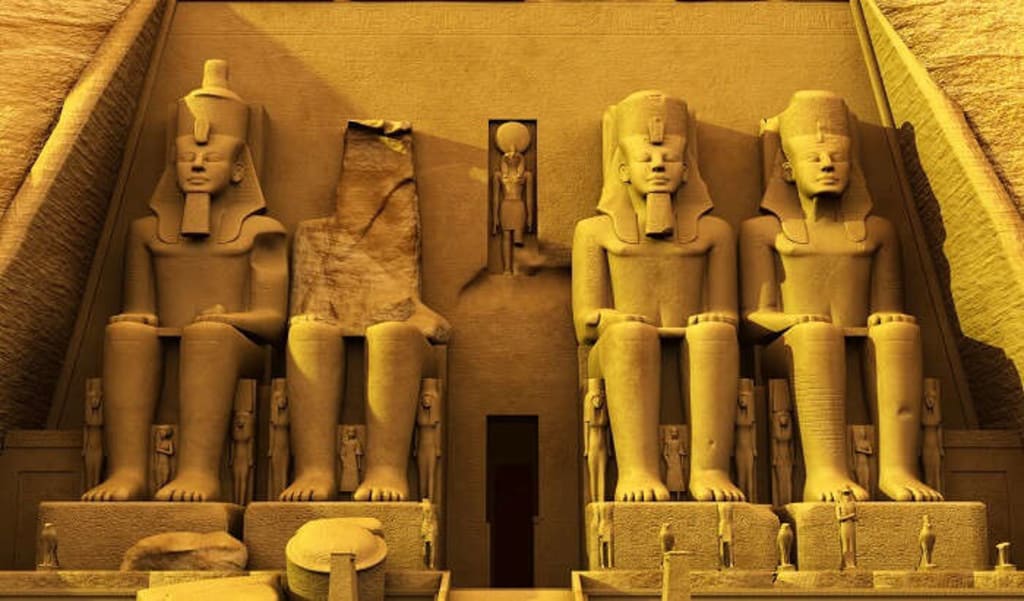"Egypt at Glance"
The History, Culture, and Economy of Egypt"

Egypt is a country located in North Africa and is one of the oldest civilizations in the world. It is known for its rich history, ancient monuments, and diverse culture.
Here are some key facts about Egypt:
Geography:
Egypt is situated in North Africa and is bordered by Libya to the west, Sudan to the south, Israel and the Gaza Strip to the east, and the Mediterranean Sea to the north.
The capital of Egypt is Cairo, and the country's largest city.
History:
Ancient Egypt was one of the world's earliest civilizations and emerged in the Nile River valley over 5,000 years ago.
The country was ruled by pharaohs, who were considered to be both political leaders and divine beings.
Egypt was conquered by several empires throughout its history, including the Persian Empire, Alexander the Great's Macedonian Empire, and the Roman Empire.
In the 7th century, the Arab Empire conquered Egypt, bringing with it the religion of Islam.
In modern times, Egypt gained independence from Britain in 1952 and has since undergone several political upheavals, including a revolution in 2011 that toppled longtime dictator Hosni Mubarak.
Culture:
Egypt has a rich and diverse cultural heritage that draws from its ancient history, Islamic traditions, and African roots.
Islam is the dominant religion in Egypt, and the country has a significant Coptic Christian minority.
Egyptian cuisine is known for its use of spices and herbs, as well as dishes like koshari (a mixture of rice, lentils, and pasta) and ful medames (fava beans stewed with spices).
Music and dance are also important cultural elements in Egypt, with traditional styles like belly dancing and Sufi music still popular today.
Tourism:
Egypt is a popular tourist destination, thanks in large part to its ancient monuments and historical sites, such as the pyramids of Giza, the Sphinx, and the temples of Luxor.
Other popular attractions include the Red Sea resorts of Sharm el-Sheikh and Hurghada, as well as the bustling streets of Cairo and Alexandria.
Economy:
Egypt has a mixed economy with a large public sector, a growing private sector, and significant foreign investment.
The country's economy is heavily dependent on tourism, Suez Canal revenues, and remittances from Egyptians working abroad.
Major industries in Egypt include textiles, food processing, chemicals, and petroleum refining.
Language:
The official language of Egypt is Arabic, and it is spoken by the majority of the population.
Egyptian Arabic is a dialect of Arabic that is specific to Egypt and is the most widely spoken variety of Arabic in the country.
English and French are also spoken by many educated Egyptians.
Education:
Education in Egypt is free and compulsory for all children between the ages of six and 15.
The literacy rate in Egypt is around 73%, with higher rates for men than for women.
The country has a number of well-regarded universities, including Cairo University and the American University in Cairo.
Sports:
Football (soccer) is the most popular sport in Egypt, and the national team has won the Africa Cup of Nations seven times.
Other popular sports in Egypt include basketball, volleyball, handball, and squash.
Egypt has hosted a number of international sporting events, including the African Cup of Nations and the World Men's Squash Team Championship.
Politics:
Egypt is a republic with a president as the head of state and a prime minister as the head of government.
The current president of Egypt is Abdel Fattah el-Sisi, who has been in power since 2014.
Egypt has a complex political history, including periods of military rule and multiple revolutions and uprisings in the 20th and 21st centuries.
Religion:
The majority of the population in Egypt practices Sunni Islam, which is the official religion of the country.
Egypt is also home to a significant Coptic Christian minority, which makes up around 10% of the population.
Other religious groups in Egypt include Shia Muslims, Baha'is, and small Jewish and Hindu communities.
Climate:
Egypt has a hot and arid climate, with temperatures that can reach over 40 degrees Celsius in the summer months.
The country is largely desert, with the Nile River Valley and Delta being the most fertile and habitable areas.
Coastal regions of Egypt, including the Red Sea and Mediterranean coasts, have more moderate temperatures and are popular tourist destinations.
Wildlife:
Egypt is home to a variety of wildlife, including camels, gazelles, jackals, and hyenas.
The Nile River is home to a number of aquatic species, including crocodiles and hippopotamuses.
Egypt is also known for its birdlife, including the Egyptian vulture and the hoopoe.
Art and Architecture:
Egyptian art and architecture have been influential throughout history and are known for their grand scale and intricate details.
The ancient Egyptians were skilled architects and engineers, and their monuments and temples, such as the pyramids of Giza and the temples of Luxor and Karnak, continue to inspire awe today.
Islamic art and architecture are also important in Egypt, with notable examples including the mosques of Cairo and the Citadel of Saladin.
Cuisine:
Egyptian cuisine is known for its use of herbs and spices, such as cumin, coriander, and garlic.
Popular dishes include koshari, ful medames, and taameya (Egyptian falafel).
Egyptian sweets, such as baklava and basbousa, are also popular.





Comments
There are no comments for this story
Be the first to respond and start the conversation.